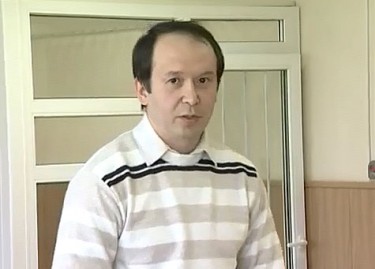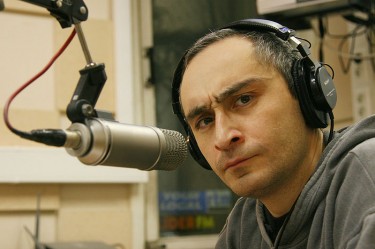Following President Medvedev's speech on extremism on the Russian Internet, security services began a campaign against online neo-Nazis and outspoken Russian nationalists.
On May 28, 2011, the campaign against racial and religious extremism found an unusual enemy – Leonid Kaganov, one of Russia's oldest bloggers, a poet, and a science fiction writer.
Anti-extremism campaign
On May 23, 2011, nearly a month after his meeting with bloggers and an ambitious promise “not to put a hand on the Internet,” President Medvedev held a meeting on the subject of extremism. During the meeting the minister of Internal Affairs, Rashid Nurgaliev reported [ru] 208 investigations of online extremist publications, 54 criminal cases against online extremists, and 47 cases of closed websites.
Additionally, the Sova Center reported five cases of prosecution of extremists in the Russian regions in May 2011. These involved anti-North Caucasian films in the Vkontakte network in Chelyabinsk [ru] and Nizhny Novgorod [ru], neo-Nazi films in Tomsk, xenophobic status messages in Lipetsk [ru], and hate crime posters in Tula [ru]. Most of the prosecuted extremists were found in the Vkontakte network, which shows that this social network is closely monitored by the police and the prosecutors’ office.
While general prohibition against xenophobia, racism, and hate crimes is considered by many governments to be a valid legal basis for restricting certain content on the Internet, Russia's prohibitions are complicated by circumstances. The war on extremism (waged throughout the 2000s) has been a convenient tool for imprisoning radical politicians all over the country.
State control of the mainstream media, such as the recent case of pressure on REN TV, or RosKomNadzor's issue of a legal notice to Radio Liberty [ru] in April 2011, and the upcoming elections mean that any new campaigns, even against ‘growing extremism’, deserve scrutiny.
Commenting on Medvedev's double-faced attitude towards Internet regulation and the recent e-G8 summit, fake Twitter Kremlin account @kermlinrussia made an acid remark [ru] says:
Сегодня на #G8 обсуждали будущее Интернета. Сеть должна быть свободна, но некоторых ее пользователей лучше бы посадить.
Side effects
Apart from such suspicions, the prosecution of online extremists has obvious side effects. In February 2011, an administrative case was started against Roman Hozeev (aka LJ-user horoxp [ru]). Hozeev won the first case in April; however, the Prosecutor's office appealed the ruling.
The police opened the case because of a comment on a local message board written in 2005, where Hozeev compared George W. Bush to Adolf Hitler. Hozeev's quotations of ‘Main Kampf’ were online before they were legally recognized as extremist (and thus forbidden to be even quoted online), which allowed prosecutors to creatively evade the ‘lex retro non agit‘ legal principle and state that Hozeev deliberately dispersed forbidden materials for nearly six years.
On May 28, 2011, news broke about another ‘extremist.’ Leonid Kaganov [ru], 39, one of the first and most influential bloggers in RuNet. Yandex rates [ru] his blog, lleo.aha.ru, 27th in influence.
Also a science fiction writer and comedy scenarist, Kaganov was around for the dawn of RuNet, moderated legendary FidoNet communities such as OBEC.PACTET (‘oats are growing’) and SU.KASHENKO.LOCAL. His blog was never politicised. In fact, Kaganov often mocked the overt politicisation of blogs. The fact that Kaganov is of Jewish origin makes the accusations against him even stranger.
In a blogpost at the newly created lleo.me, registered on May 27, 2011, Kaganov tells the story of his ‘anti-semitism.’ Back in 2009, Kaganov quoted [ru] an anti-semitic poem included in the Ministry's of Justice list of extremist materials. Mocking the poem and its author, Kaganov asked his readers, whether the practice of forbidding poems exists in other countries, whether bloggers can quote such poems, and what one has to do in order to have his/her poems prohibited by the Ministry of Justice.
Virtual Emigration
After the publication, Kaganov received a message from his hosting provider, Zenon N.S.P., that Federal Security Service (FSB) was concerned about the publication of the forbidden poem. Shortly after that, he removed the poem, and wrote [ru] a parody (first letter of every line of the new poem said: “What's the problem, it's a different poem”).
Posting a parody instead of an actual ‘forbidden’ poem, however, didn't solve the problem. Several months after the replacement, representatives of Zenon contacted Kaganov again and said that the FSB issued an order to remove the page (although no document supporting this claim is public). Unwilling to get into conflict with FSB, the provider saved the data and gave it to Kaganov, to prevent its loss. Kaganov then created lleo.me, hosting it on the German ISP Hetzner Online A.G.. On May 28, 2011 the old site, lleo.aha.ru started to function as a redirect to lleo.me.
Virtual emigration to non-Russian hosting and non-Russian domain name, as in Kaganov's case, is a key solution to secure online voice, even for non-politicised bloggers. Such a solution is only possible, if the Internet stays international and interconnected. If the idea of a ‘sovereign Internet,’ a projection of the state sovereignity online with its borders and state control, succeeds, virtual emigrants like Kaganov will be detached from their audience for good.
In a final note Kaganov wrote that he was never interested in politics, or business, and has been always a patriot of Russia. “I'm only concerned about elves and Sirius [star often mentioned in sci-fi jokes].”
injuria_realis grimly commented [ru]:
Почему-то для меня это служит отличной иллюстрацией поговорки “Если ты не интересуешься политикой, то политика заинтересуется тобой”.










5 comments